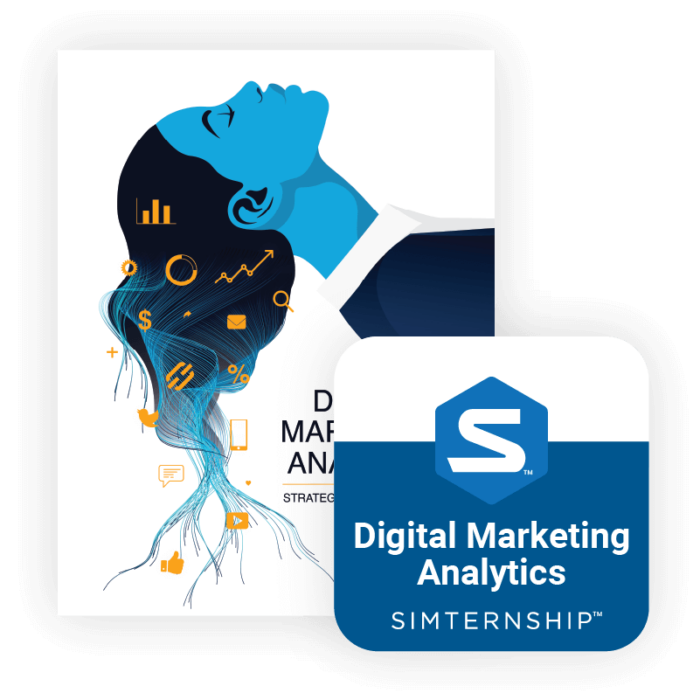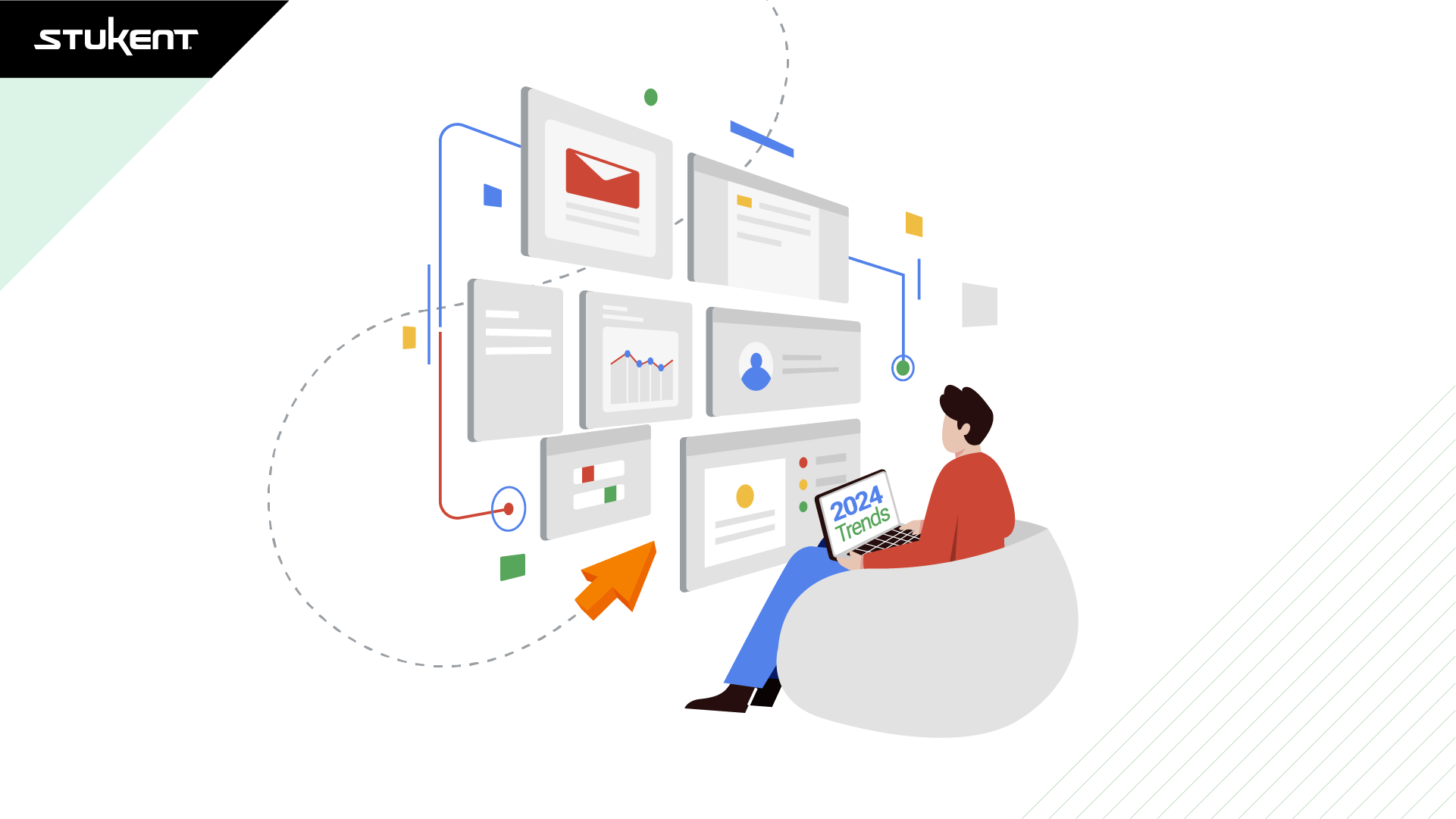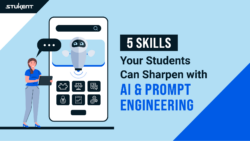Staying informed about the latest analytics trends is crucial for educators. As we enter 2024, several trends will redefine how we understand consumer behavior and measure marketing success. Read on for an overview of these trends and ideas for introducing the topics in your classroom!
1. Augmented Analytics
Augmented analytics stands at the forefront of a data revolution, integrating AI and machine learning to transform data interpretation. Tableau from Salesforce defines it as “a class of analytics powered by artificial intelligence (AI) and machine learning (ML) that expands a human’s ability to interact with data at a contextual level.”
This trend is reshaping data analysis, making it more accessible and intuitive. The use of Natural Language Processing (NLP) in augmented analytics allows for a seamless translation of complex data insights into understandable narratives, making it a game-changer in data science education.
You can introduce students to augmented analytics through hands-on experience with a leading platform such as Microsoft or Salesforce. Assign them a project in which they analyze a diverse dataset, focusing on extracting meaningful insights. Emphasize the role of NLP by having students translate complex data insights into narrative reports suitable for a non-technical audience. This approach not only makes data analysis more accessible but also prepares students for real-world scenarios where they need to communicate data-driven insights clearly.
2. XAI (Explainable AI)
Explainable AI addresses the growing need for transparency in AI decision-making processes. As AI models become increasingly complex, understanding their logic and reasoning is crucial for trust and accountability. XAI seeks to make AI decisions understandable to humans, ensuring that AI systems can be used responsibly and ethically.
You can incorporate XAI in your lessons by using tools like AI Explainability 360 or Google’s What-If Tool. Task students with evaluating a pre-trained credit-scoring AI model, using these tools to decipher its decision-making process. Focus on the ethical implications and potential biases in AI decision-making, guiding students to understand the importance of transparency and accountability in AI systems. This exercise will sharpen their critical thinking about the responsible use of AI technology.
3. Edge Analytics
Edge analytics redefines data processing by bringing it closer to the data source, significantly enhancing speed and efficiency. This is crucial in scenarios where real-time analytics is vital, such as in predictive maintenance or emergency healthcare situations. By processing data on-site, edge analytics eliminates latency, offering instantaneous insights critical in time-sensitive environments.
Bring edge analytics to life in your classroom by designing a lab project where students create a real-time traffic management system. You can use simulation software that mimics edge computing environments to demonstrate the speed and efficiency of processing data close to its source. This project should highlight the advantages of edge analytics in providing instantaneous insights, crucial in time-sensitive applications such as traffic management or emergency response systems.
4. Data Governance and Ethics
The intersection of data governance and ethics is becoming increasingly relevant as organizations navigate the complexities of data privacy and ethical use. This trend encompasses not just the technical aspects of data management but also its moral responsibilities. As data becomes a crucial asset, stringent governance and ethical frameworks are essential.
To incorporate this topic in your course, develop a comprehensive module on data governance and ethics using the GDPR framework as a reference. You can engage students in analyzing real-world case studies, such as Facebook’s data privacy challenges, to understand the complexities of data governance. You could also stimulate ethical debates and discussions by presenting dilemmas surrounding personal data usage in marketing. This approach will help students grasp the moral responsibilities and technical aspects of data management in today’s data-driven world.
5. DataOps
DataOps, inspired by the principles of DevOps, emphasizes streamlined and efficient data management. It involves automating data pipeline processes and fostering collaboration between data teams and IT departments. Data is a critical business asset in an era where DataOps ensures data quality, accessibility, and agility in data-driven initiatives.
Introduce students to DataOps by setting up a project focused on creating an automated ETL pipeline using tools such as Apache Airflow. Encourage collaboration by simulating a scenario where data teams work with IT departments to optimize data workflows.
For a real-world perspective, analyze case studies from companies such as Netflix or Amazon, showing how effective DataOps strategies enhance content recommendation systems. This hands-on experience will provide students with practical skills in streamlining data management processes.
6. Quantum Computing
Quantum computing is also at the cutting edge of computational technology, offering unparalleled processing power for specific data problems. Leveraging principles of quantum mechanics, it can potentially revolutionize fields like cryptography and complex system modeling. While still in its nascent stages, quantum computing is poised to transform the data analytics landscape.
Engage students with quantum computing through a workshop using IBM’s Quantum Experience or Microsoft’s Quantum Development Kit. Assign a research project on quantum computing’s potential applications in cybersecurity, focusing on encryption and decryption methods. Discuss the future impacts of quantum computing on big data analytics, highlighting its capabilities in solving complex problems more efficiently than traditional computing. This activity will broaden students’ understanding of quantum mechanics principles and their revolutionary implications in computing.
Staying Ahead of the Trends with the Digital Marketing Analytics Bundle
The Stukent® Digital Marketing Analytics Bundle provides comprehensive courseware for teaching digital marketing analytics. It includes lessons on Google Analytics 4, various aspects of digital marketing analytics, and hands-on learning through the Digital Marketing Analytics Simternship™. The bundle covers topics such as consumer data, business analytics maturity, measurement models, data-driven decision-making, and optimization strategies for different media types. It is designed to easily integrate with learning management systems and is updated annually to stay current.

By integrating some of these trends, classroom activities, and the Digital Marketing Analytics bundle into your curriculum, you can ensure that your students have the practical skills and critical thinking necessary for their future careers.
To learn about Stukent’s first-in-the-world Simternships and courseware and to get FREE instructor access to Stukent materials, visit our website.






